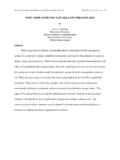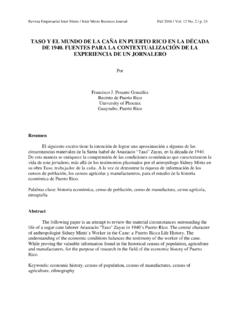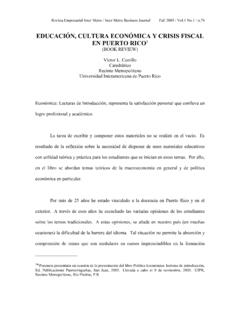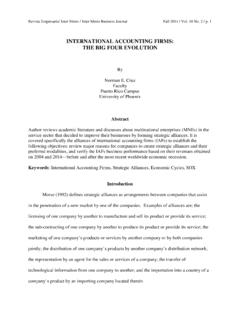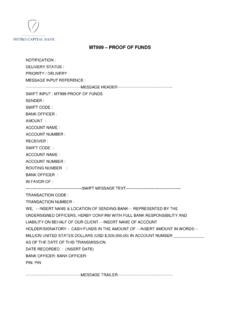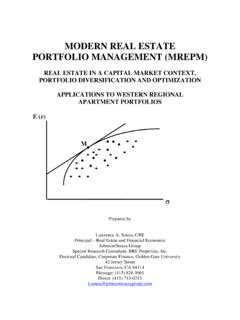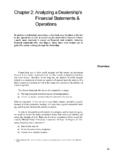Transcription of THE IMPLICATIONS OF MATERIALITY CONCEPT ON …
1 Revista Empresarial Inter metro / Inter metro Business Journal Spring 2009 / Vol. 5 No. 1 / p. 22 THE IMPLICATIONS OF MATERIALITY CONCEPT ON ACCOUNTING PRACTICES AND DECISION MAKING By Ahmad H Juma'h Professor Metropolitan Campus Inter American University of Puerto Rico The MATERIALITY CONCEPT is crucial for economical decision making. In accounting practices, accountants are still need to develop more specific MATERIALITY guidelines to avoid judgmental decisions. It seems that the accountant practices and judgments are the dominants in considering the MATERIALITY of an economical event.
2 Keywords: MATERIALITY , accounting practices, accountants judgments, International GAAP, US GAAP. Introduction The application of MATERIALITY is not a new issue. The MATERIALITY is applied for most decisions involving economical activities. Since 1800 s, the United Kingdom courts had emphasized the importance of the disclosures to the users of financial statements. In the United States, the discussion about the importance and IMPLICATIONS of MATERIALITY increased after The Security Act of 1933.
3 The MATERIALITY CONCEPT is important for all decision making topics. Also the implication of MATERIALITY is essential to understand and apply the generally accepted accounting principles (GAAP) and to prepare and analyze the financial statements. The MATERIALITY CONCEPT plays a central role in any decision making related to all management fields and in accounting field in particular. Items, transactions or events that Revista Empresarial Inter metro / Inter metro Business Journal Spring 2009 / Vol.
4 5 No. 1 / p. 23 are considered immaterial are not reported separately in the financial statements, and therefore, information considered immaterial by accountants is not reported to investors, creditors, and other users of financial statements. This leads stakeholders to be aware of all public information (mandatory or non-mandatory information). According to Watts and Zimmerman (1986), in some instances investors give more attention to the released no-mandatory information. According to Bernstein (1967) the CONCEPT of MATERIALITY is simple but it is central in applying GAAP and this makes it a problematic issue for accountants.
5 In analyzing the MATERIALITY importance in decision making, this article is organized in the following sections presents some definitions of MATERIALITY , the third sections deals with MATERIALITY classification, the fourth section presents final remarks. Definition of MATERIALITY Authoritative accounting bodies in the USA such as Financial Accounting Standard Board (FASB), Securities and Exchange Commission (SEC), General Accounting Office (GAO), American Institute of Certified Public Accountants (AICPA) and in the international arena, The International Accounting Standards Committee (IASC) have contributed to clarify the MATERIALITY CONCEPT .
6 FASB Concepts Statement No. 2, Qualitative Characteristics of Accounting Information (1980) defines MATERIALITY as follows: The magnitude of an omission or misstatement of accounting information that, in the light of surrounding circumstances, makes it probable that the judgment of a reasonable person relying on the information would have been changed or influenced by the omission or misstatement (Para. 132). Revista Empresarial Inter metro / Inter metro Business Journal Spring 2009 / Vol.
7 5 No. 1 / p. 24 This definition is quoted by Statement on Auditing Standards (SAS) No. 47, Audit Risk and MATERIALITY in Conducting an Audit (AICPA 1983, AU 312) without providing computational measures or guideline. SAS No. 47 discusses audit risk and MATERIALITY in planning and audit, stating that As a result of the interaction of quantitative and qualitative considerations in MATERIALITY judgments, misstatements of relatively small amounts that come to the auditor s attention could have a material effect on the financial statements Based on Regulation S-X, Rule 1-02 (1940), the SEC (1995) defines MATERIALITY as follows.
8 The term material when used to qualify a requirement for furnishing of information as to any subject, limits the information required to those matters as to which an average prudent investor ought to reasonably be informed before purchasing the security registered . According to SAB 99 qualitative factors should be considered on the basis of the aggregate items not only on the base of a single item. The SAB 99 states that: The omission or misstatement of an item in a financial report is material if, in the light of surrounding circumstances, the magnitude of the item is such that it is probable that the judgment of a reasonable person relying upon the report would have been changed or influenced by the inclusion or correction of the item.
9 Magnitude by itself, without regard to the nature of the item and the circumstances in which the judgment has to be made, will not generally be a sufficient basis for a MATERIALITY judgment.. Qualitative factors may cause misstatements of quantitatively small amounts to be material Revista Empresarial Inter metro / Inter metro Business Journal Spring 2009 / Vol. 5 No. 1 / p. 25 The GAO establishes in Government Auditing Standards that auditors may set lower MATERIALITY level and states that: In an audit of the financial Statements of a government entity or an entity that receives government assistance, auditors may set lower MATERIALITY levels than in audits in the private sector because of the public accountability of the entity, the various legal and regulatory requirements, and the visibility and sensitivity of governmental programs, activities, and functions (GAS, 1994.)
10 34) The International Accounting Standards Committee (IASC) (1989) defines the information as MATERIALITY as follows: Information is material if its omission or misstatement could influence the economic decisions of users taken on the basis of the financial statements. MATERIALITY depends on the size of the item or error judged in the particular circumstances of its omission or misstatement. Thus, MATERIALITY provides a threshold or cut-off point rather than being a primary qualitative characteristic which information must have if it is to be useful.
